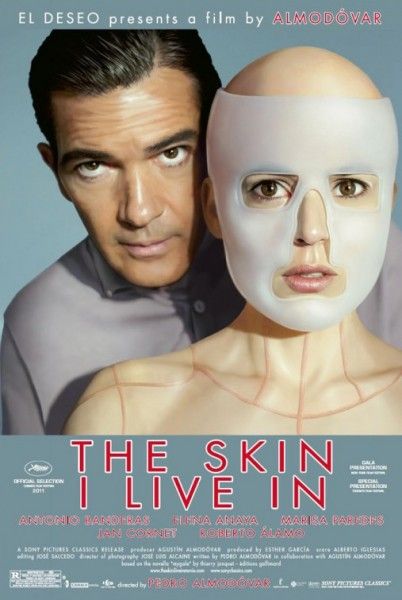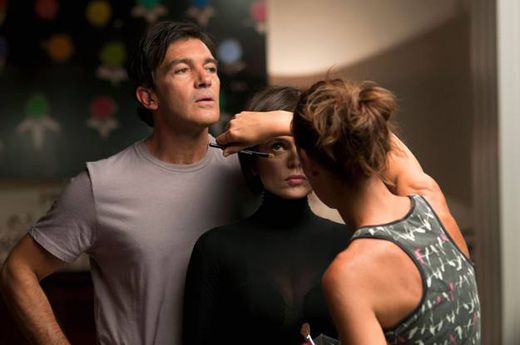From Spanish filmmaker Pedro Almodovar, The Skin I Live In is a story of extreme revenge. Ever since his wife was burned in a car crash, eminent plastic surgeon Dr. Robert Ledgard (Antonio Banderas) has been obsessed with creating a new skin that could have saved her. After years of study and experimentation, he needs a human guinea pig – one whom no one will miss.
At the film’s press day, actor Antonio Banderas spoke to Collider for this exclusive interview about the genesis of this project, what it was like to reunite with Pedro Almodovar after more than 20 years since their last film together, what it was like to play such a cold and emotionless psychopath, and working on set with such an oppressive mood, in telling this very layered and complex story. He also talked about getting to explore his lighter side for Puss in Boots, and how he hopes his bad boy cat gets a franchise of his own. Check out what he had to say after the jump.
Since you hadn’t worked with Pedro Almodovar in over 20 years, how did this come about for you?
ANTONIO BANDERAS: It was actually at the Cannes Film Festival in 2002. I was there with Brian DePalma, and he was presenting Bad Education, and he said, “I have to talk to you.” So, he told me how he just bought the rights to this novel by Thierry Jonquet (called Tarantula). He said, “I would like to make a movie out of it, and I would like to use you. What do you think?” He told me the story and I said, “Only you can do this movie,” but I said, “Yes, I am definitely interested.”
So then, almost 10 years happened until the script came. I was actually in New York doing a workshop, and I came out of the theater and got in my car and got a telephone call from Pedro Almodovar. I said, “Hey, what’s up?,” and he said, “It’s about time.” I said, “Okay, I’m here.” So, he sent me the script and the surprise started. Even though I knew the story, I was astounded by the way that he told the story on paper, and the game that he played with time, establishing this huge, enormous, one-hour question, at the beginning of the movie, that doesn’t have an answer, and then all of the disturbing answers.
It was unbelievable. The feeling was like a roller coaster where you go all the way up to the top, and then you fall down the other side. So, I laughed and I was scared of the material. A couple of months after, we were already in rehearsal with it. And then, we just got in the mud and got dirty, which is what I love to do with Pedro Almodovar, and we started to put together this thing.
What was it like to reunite with Almodovar, after so many years?
BANDERAS: It was tough and difficult, but beautiful. Every time, I reaffirm in myself that the more comfortable you are, the less you are creating. You have to feel a little bit of pain in the creation. Pedro doesn’t allow you to use tricks, or things that you travel with. If you have a backpack filled with things and you put it on the table, he says, “What is that? No, we’re not going to use that. We’ll start from scratch.” That is painful sometimes because you don’t have anywhere to hold. You’re just there naked, saying, “Where are we going?” Even though it’s Almodovar and I’ve done movies with him, you have no references with him because he goes on different paths every time, so you don’t know. I just needed to feel that acid taste in my mouth, working with him again. It’s been a beautiful experience.
How did you approach this character? Was it difficult not to judge him, while you were playing him?
BANDERAS: I did that. I didn’t want to champion him at all. Pedro and I decided just to make him very economical, very contained, and almost like a wide screen, where the audience could write their own fears. He’s a psychopath like we’ve seen many times on television. They arrest serial killers and interview people who are around them, like friends and neighbors, and they say, “Oh, he was a very charming guy, who was very well dressed and well mannered,” but he has five guys mutilated in the basement. These guys actually meld very well into society. They’re perfectly undetectable, so it’s very difficult.
Once we decided to go on that path, what I did was just try to compartmentalize the character and try to play him almost like a family doctor, not judging him and forgetting about the story. I just went for the very specific moment, and separated that and sewed that to the next moment, trying to make them natural and believable. When you do that, you feel a little bit of vertigo because you say, “Oh, my god, it’s going to be unbelievably flat.” But then, Pedro was always there to tell me, “Remember that I am telling the story. The story is going to be told. I don’t want you to just wink an eye to the audience, not for one second, because he’s a human being too, and I want to project him like that.”
The movie is filled with all of these little details. But, at the time that I was working on it, I tried just to be very specific in what I was doing. Everything else are reflections that I have made from watching the movie, as a spectator. At the moment that we were working, I was totally concentrating on trying to make the character very natural, not feeling guilty for anything, and totally disaffectionate for other’s pain, and focus on his line of work, and that’s it.
What was the mood like on set, for something with this type of subject matter?
BANDERAS: The universe that Pedro created was very oppressive. The set was almost like a cathedral. When you got into the surgery room, it was almost like getting into a church, with the silence. It was difficult to get in, and difficult to get out.
Is it fun then, to get to explore your lighter side with Puss in Boots?
BANDERAS: It’s like fire and ice. But, movies serve many purposes, and I’ve visited many of those genres, from the most light, frivolous comedy that is just trying to make you laugh, to movies that explore the most complicated side of the human soul. As an actor, I play all of those things, and I still like it. But definitely, at this particular time in my life, I just want to get in the mud with Pedro.
He has been so many things to me. We met each other 30 years ago, and started making movies. We used to go to film festivals, like Cannes, with his movies, and then we won the festival. It was emotional when we got together again. I remember the first day that we did the first take. We looked at each other and it was like, “So many things have happened to you and to me, and this is our sixth movie together.”
I know that when I die, no matter when that happens, people will make references to those movies. Even if I do the worst movies ever done, from here on, they will talk about Almodovar, and that’s beautiful. He created something completely new, from scratch. That is priceless. You may like the movie or not, but that’s the truth.
Are you hoping Puss in Boots will become its own franchise?
BANDERAS: I don’t know. That depends on the audience. You never know. I love the character. Wait until you see the movie! He’s such a bad boy.




